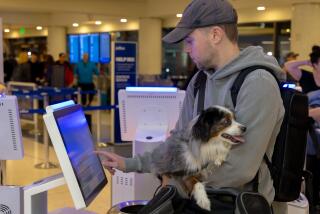Travel by plane and you might get ‘flight shamed.’ This worries airlines

- Share via
Environmental crusader Greta Thunberg is starting to make some U.S. airlines nervous.
The Swedish teenager, who has been vocal about combating climate change, may have played a role in a recent 4% drop in the number of commercial passengers flying in Sweden, where the term “flygskam,” or flight shame, has gained popularity.
Some U.S. airline executives are now expressing concern that the same guilt could take hold in the U.S., prompting American travelers to think twice before buying an airline ticket.
Robin Hayes, chief executive of New York-based JetBlue Airways, told industry analysts during a conference call recently that it’s only a matter of time before Americans follow the lead of their Swedish counterparts to find more environmentally friendly alternatives to commercial air travel.
“This issue presents a clear and present danger, if we don’t get on top of it,” he said. “We’ve seen that in other geographies and we should not assume that those sentiments won’t come to the U.S.”
Although flight shame hasn’t caught on as strongly in the U.S. as in Europe, airline industry experts say carriers are amplifying their efforts to cut emissions to help ease the concerns of fliers, especially young travelers who are more likely to change their travel plans based on environmental issues.
“Today’s environmentally focused 22-year-old is tomorrow’s 35-year-old frequent business traveler,” said Henry Harteveldt, a travel industry analyst with the Atmosphere Research Group. “The industry wants to make sure everyone, regardless of age, knows what they are doing.”
Emissions of the greenhouse gas carbon dioxide from all commercial flights, including cargo and passenger planes, represented 2.4% of all global CO2 emissions in 2018 — a 32% increase over five years earlier, according to a study by the International Council on Clean Transportation. Flights from the U.S. represent about a quarter of the world’s passenger flight emissions, the study found.
Airline travel globally had been growing steadily by about 5% each year over the last decade, according to the International Air Transport Assn., a trade group for the world’s air carriers. But in 2019, the growth rate slowed to 4%; it was the first time traffic grew less than 5% since the global financial crisis, dragged down by declines in Sweden and Germany.
U.S. demand for airline seats has been growing by about 4% each year thanks to a strong economy and low fuel prices that result in relatively cheap airfares.
If global passenger demand continues to grow at the same pace, CO2 emissions from air travel will triple by 2050, according to an estimate by the International Civil Aviation Organization, the aviation branch of the United Nations.
Citigroup in October said that flight shaming is a real threat to the airline industry and that the cost of carbon offset programs — such as planting trees— could cut industry profits by 44% by 2025.
Mark Manduca, a Citi managing director, predicted that flight shaming would put “downward pressure to demand growth forecasts.” But he said that “investors believe that flight shaming will largely be a European phenomenon, with Germany, France and Sweden likely to see the largest impact.”
One reason fliers in Europe may be more willing to cut back on flying is that Europe has more transportation alternatives to commercial airlines, including high-speed rail, than the U.S., he said, adding that he believes that short-haul flights, about 600 miles, are most likely to be affected by flight shaming in Europe.
Brandon M. Graver, an aviation researcher for the International Council on Clean Transportation, said it is too early to tell if environmental concerns will begin to hurt the airline industry in the U.S.
“There are plenty of news stories of individuals who have decided to eliminate flying, but they are the exception,” he said.
Those exceptions include Bhima Sheridan, a real estate agent from Berkeley, who said he and his wife haven’t taken a commercial flight since early 2019 and plan to avoid flying throughout 2020 to help reduce environmental harm. He said he was inspired to take action by Thunberg as well as his own long-held concerns about climate change.
For spring break, he said, he plans to take his family to Seattle, but they will travel on trains instead of airplanes.
“We thought, ‘What is the biggest impact we can make immediately?’” he said. “We decided to be flight free for 2020. It’s an attempt to bend the curve. If you look at global emissions, they keep rising.”
Maro Kakoussian, who works for the nonprofit Physicians for Social Responsibility in Los Angeles, said she has gone four years without flying because of her concern for the harm airplane emissions have on the planet, opting instead to take trains or stay locally for vacations.
At work, her organization has eliminated most short-haul flights within the state, turning to online videoconferencing for meetings and retreats.
“I think once people are educated enough and realize how much of an impact one flight can have on carbon emissions, they will take fewer flights,” Kakoussian said.
In response to such concerns, airlines are promoting their efforts to offset emissions by paying to plant trees or funding renewable energy projects.
The world’s airlines, including U.S. carriers, signed on to a voluntary agreement in 2016 called the Carbon Offsetting and Reduction Scheme for International Aviation.
Several airline executives point to the agreement as evidence that the industry takes climate change seriously, but the agreement seeks only to keep carbon emissions from growing above a 2020 baseline on international flights, not domestic flights.
And some environmentalists call carbon offsetting by airlines a short-term, stop-gap measure.
When British budget carrier EasyJet said last November that it had begun to offset all emissions across its network, Greenpeace’s chief scientist in Britain, Doug Parr, called it a “jumbo-size greenwash.”
Airlines for America, a trade group for U.S. air carriers, responded: “We are confident that when our passengers know the facts about our environmental record and all we do to connect the world, they will remain proud to fly,” spokesman Carter Yang said.
In January, JetBlue announced plans to become carbon neutral on all domestic flights beginning July 2020, and to use an alternative fuel source for flights leaving from San Francisco.
The airline said it will offset its fleet’s CO2 emissions by partnering with several carbon reduction organizations, including Carbonfund.org, which supports tree planting efforts, the preservation of forests in Brazil and the construction of renewable energy plants, among other projects. JetBlue promises the carbon-neutral efforts will not raise airfares.
“This is the cost of doing business,” JetBlue spokeswoman Tamara Young said.
Germany’s Lufthansa launched a business fare with a unique feature: The emissions of European flights are automatically offset for corporate customers.
British Airways’ parent company, IAG, promised last year to be carbon-neutral by 2050 and to start offsetting all domestic flights this year.
Delta Air Lines announced in December plans to purchase 10 million gallons per year of advanced renewable biofuels from a Colorado-based company called Gevo. The announcement came only two months after Delta made a $2-million investment in another biofuel company in Arizona for a feasibility study of a facility to produce “sustainable aviation fuel and other biofuel products” in Washington state.
American Airlines, the world’s largest carrier, created and filled a new managing director position in November to oversee the company’s sustainability program. Among other efforts, American Airlines says it has added more fuel-efficient planes to the fleet, cut the weight of the planes by eliminating unnecessary items and reduced the time planes run their engines while taxiing.
“We recognize that air travel has impacts on the environment, and we’re committed to proactively minimizing those impacts in a number of ways,” American Airlines spokesman Curtis Blessing said.
Last May, United Airlines renewed a contract with Boston-based World Energy, agreeing to purchase up to 10 million gallons of aviation biofuel over the following two years. The biofuel, which United uses to power flights from Los Angeles International Airport, reduces emissions by more than 60%, according to the airline. The contract renewal with World Energy is part of a bigger effort by the airline to achieve its goal of cutting emissions by 50% by 2050 compared with its emissions in 2005.
“United is proud to be a leader among global carriers in environmental sustainability,” United spokeswoman Andrea Hiller said.
More to Read
Inside the business of entertainment
The Wide Shot brings you news, analysis and insights on everything from streaming wars to production — and what it all means for the future.
You may occasionally receive promotional content from the Los Angeles Times.











